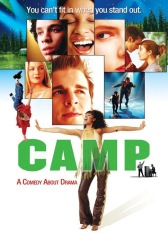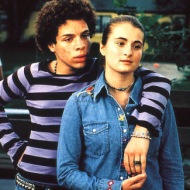|
Camp
|
| |
 |
USA, 2003. Rated PG-13. 114 minutes.
Cast:
Daniel Letterle, Joanna Chilcoat, Robin De Jesus, Don Dixon, Steven Cutts,
Vince Rimoldi, Kahiry Bess, Tiffany Taylor, Sasha Allen, Alana Allen,
Anna Kendrick, Robert Orosco, Stephen DiMenna, Omar Edwards
Writer: Todd Graff
Music: Stephen Trask
Cinematography: Kip Bogdahn
Producers:
Director: Todd Graff
LINKS
|
 n
1979, a coming-of-age comedy called Meatballs followed a group of young
summer-camp misfits as they discovered their self-esteem and beat overwhelming
odds to best wealthier and more popular kids in a big athletic competition at
summer's end. And they learned a thing or two about friendship in the process.
n
1979, a coming-of-age comedy called Meatballs followed a group of young
summer-camp misfits as they discovered their self-esteem and beat overwhelming
odds to best wealthier and more popular kids in a big athletic competition at
summer's end. And they learned a thing or two about friendship in the process.
In 1980, a coming-of-age musical drama called Fame followed a group
of talented high-school performing arts students as they discovered their talents
and took on adolescence, culminating in a big musical production that celebrates
the students' creativity. And they learned a thing or two about friendship in
the process.
Now, in 2003, a coming-of-age musical comedy/drama called Camp follows
a group of young, talented high school misfits at a summer camp for the performing
arts as they take on adolescence, overcome their insecurities, and discover
their self-esteem, culminating in a big summer-ending musical production that
celebrates their creativity. And learn a thing or two about friendship in the
process.
Inspired by his own teenaged experiences at Stagedoor Manor, first-time writer/director
Todd Graff takes us to a different sort of summer camp, one for budding artists
of the musical theater. You know the ones, the freaks and geeks from the high
school Drama Club, where they are largely ignored by the rest of the students
except when some bully needs a likely target for a wedgie. Graff sketches a
quick portrait of these teen's high school existence with a couple quick scenes.
Ellen (Joanna Chilcoat) is so unpopular that she unsuccessfully begs her own
brother to take her to the junior prom, while Michael (Robin De Jesus) has the
snot knocked out of him for showing up to his own junior prom in drag.
Every year, Camp Ovation provides a respite for these kids, nurturing their
talent and their passion safely away from the ridicule of others. The film joins
Ellen and Michael and others as they renew friendships and enmities from the
summer before. Then Vlad (Daniel Letterle) shows up. With his skateboard and
all-American poster-boy good looks, Vlad is like the Sesame Street song. He
is not like the others. Surrounded by his less attractive and mostly gay peers,
Vlad fits in as poorly as the other kids do during their regular school years.
A potential source of conflict? Yes, but not in the way one might expect. Vlad
quickly establishes himself as a nice guy and immediately becomes the target
of both male and female attention—and competition.
Vlad, Ellen, and Michael form a triangle at the center of the film, but subplots
abound, some formulaic and others inventive. On the formulaic side, for example,
we have bitter, alcoholic guest director Bert Hanley, the washed-up composer
of a single Broadway smash whose heart desperately needs to be touched. On the
original side, we have predatory rich-bitch Jill (Alana Allen) and her self-appointed
servant Fritzi (Anna Kendrick), who seeks to turn the tables on Jill once Jill
determines that Fritzi's idolatry has gotten way too weird.
Although the quirky comedy is sometimes based on exaggeration and caricature,
it more often flows from real-life foibles. Though a musical comedy, Camp
treats the complex, fragile kids with tenderness and empathy. Graff doesn't
make a big deal, as some other writer might, about the fact that these underage
teens are fully sexualized, nor does he treat their emotional dilemmas with
condescension. Led by a cast of surprisingly talented teenaged first-timers,
actual teen drama and dance freaks who resemble the characters they play, Camp
strives for an honest treatment of adolescence. It must be said, however, that
the obviously pre-recorded musical performances undermine that honesty. The
produced sound of some of the showtunes (many of them unbearably obvious choices)
clashes with the film's independent, shoestring-budget vibe.
Camp's freaks and geeks are different, but they know who they are. Summer
camps designed specifically for kids who are different are often the first place
where those kids are free to be themselves and their first taste of a world
that will accept them. Having been one of them, Graff explains it best, "They
have a level of introspection that kids generally don't have; they are hyper-aware
of who they are and the ways they don't seem to fit into the world. And there's
a poignancy to that since they have this haven [the summer camp] for two months
where they can become more like other kids and can have romances and do things
that traditionally are not options for them." Camp is Graff's thank you
note to Stagedoor Manor, which provided not only the setting for his own teenaged
growing experiences, but also the location for this film's shoot.
Teens form strong bonds over common interests, particularly these kids, who
are pushed together also by common rejection and victimhood. Though it may be
unpolished and a bit formulaic, Camp celebrates those bonds and reminds
us that adolescence isn't just a period of time, it's a journey of self-discovery
that, despite all parental best intentions, teens must undertake on their own.
Review
© July 2003 by AboutFilm.Com and the author.
Images © 2003 IFC Films. All Rights Reserved.


